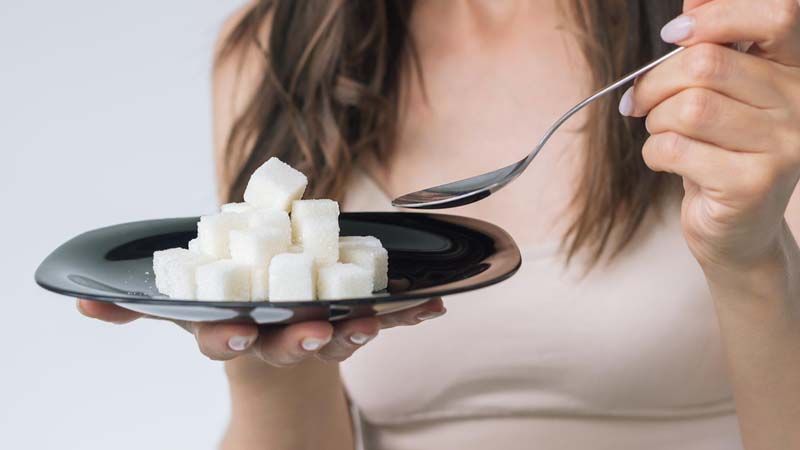Can Diet Help You Reverse Premature Greying of Hair?
- 2 months ago
Can premature greying be reversed? While you can’t restore grey hair to its original color unless you dye it, there are ways to potentially slow down the process and preserve your natural hair color for longer. Making a few lifestyle adjustments, especially focusing on nutrition, might help delay greying.
Your success largely depends on genetics, as most people start noticing grey or silver strands before turning 50. What often begins as a few scattered grey hairs can gradually spread over time. However, for those experiencing premature greying—defined as greying before the age of 30—there’s a greater motivation to take preventive steps.
Curious about how to maintain your natural hair color? Keep reading to learn about key nutrients, the role of supplements, and other proactive measures you can take!
Understanding Premature Greying
Hair greying occurs when the pigment-producing cells in hair follicles, called melanocytes, reduce or stop melanin production. Premature greying is often linked to:
- Genetics: If early greying runs in your family, you’re more likely to experience it.
- Nutritional Deficiencies: Lack of essential nutrients like vitamins, minerals, and antioxidants can accelerate the greying process.
- Oxidative Stress: An imbalance between free radicals and antioxidants damages hair follicles.
- Lifestyle Factors: Stress, smoking, and poor dietary habits can contribute to early greying.
Can Diet Reverse Premature Greying?
While diet alone may not completely reverse greying caused by genetics or age, it can slow the process and improve overall hair health. Consuming nutrient-rich foods supports melanin production and strengthens hair follicles.

Key Nutrients for Hair Pigmentation
Vitamin B12:
- Deficiency in vitamin B12 is strongly associated with premature greying.
- Sources: Eggs, dairy products, fish, chicken, fortified cereals, and nutritional yeast.
Copper:
- Copper aids in melanin production, the pigment responsible for hair color.
- Sources: Nuts (especially cashews), seeds (like sunflower seeds), shellfish, whole grains, and dark leafy greens.
Iron:
- Essential for healthy blood circulation to hair follicles.
- Sources: Spinach, lentils, tofu, red meat, dried fruits and fortified cereals.
Zinc:
- It supports hair follicle health and may reduce oxidative stress.
- Sources: Pumpkin seeds, chickpeas, oysters, and almonds.
Vitamin D:
- Linked to healthy hair follicles and prevention of greying.
- Sources: Sunlight, fortified foods, fatty fish, dairy products, mushrooms and egg yolks.
Antioxidants:
- Combat oxidative stress to protect hair follicles.
- Sources: Berries, green tea, dark chocolate, colorful fruits and vegetables like carrots, oranges, and bell peppers.
Folic Acid:
- Supports the production of red blood cells, improving scalp health and pigmentation.
- Sources: Beans, asparagus, avocados, leafy greens, beetroot and broccoli.
Omega-3 Fatty Acids:
- Nourish hair follicles and improve scalp health.
- Sources: Fatty fish, walnuts, chia seeds, and flaxseeds.
Biotin (Vitamin B7):
- Promotes healthy hair growth and may enhance pigmentation.
- Sources: Eggs, nuts, seeds, and sweet potatoes.
Selenium:
- It protects hair from oxidative damage and supports melanin production.
- Sources: Brazil nuts, seafood, dairy products, lentils, brown rice and whole grains.
Foods to Incorporate in Your Diet
- Dark Leafy Greens: Rich in iron, folic acid, and vitamin C.
- Eggs: A great source of biotin, vitamin D, and protein.
- Fish: Provides omega-3 fatty acids and vitamin D.
- Nuts and Seeds: Packed with copper, zinc, and healthy fats.
- Berries: High in antioxidants to combat oxidative stress.
- Whole Grains: Contain zinc, iron, and selenium.
- Legumes: Rich in protein, biotin, and iron.
- Carrots and Sweet Potatoes: High in beta-carotene, a precursor of vitamin A.
Lifestyle Tips to Complement Your Diet
- Manage Stress: Practice yoga, meditation, or mindfulness to reduce stress levels, which can affect hair pigmentation.
- Stay Hydrated: Proper hydration ensures optimal nutrient delivery to hair follicles.
- Quit Smoking: Smoking increases oxidative stress and accelerates aging, including premature greying.
- Use Natural Hair Care Products: Opt for shampoos and conditioners free of harsh chemicals.
- Regular Scalp Massage: Improves blood circulation, encouraging healthy hair growth and pigmentation.
Also Read: Sudden Hair Loss In Your 30s
The Role of Supplements
If dietary changes aren’t enough, supplements may help fill the gaps. Always consult a healthcare professional before starting any supplements, especially for:
- Vitamin B12
- Biotin
- Zinc
- Omega-3 fatty acids
- Antioxidants
Conclusion
While diet alone may not fully reverse premature greying, incorporating nutrient-rich foods can significantly slow the process and improve hair health. Coupled with a healthy lifestyle, these changes can make a noticeable difference. If premature greying persists, it’s wise to consult a dermatologist or nutritionist to address underlying issues. Remember, healthy hair begins with a healthy body—so start with your plate!










